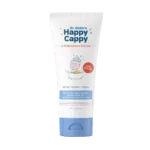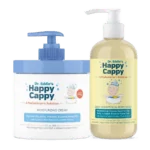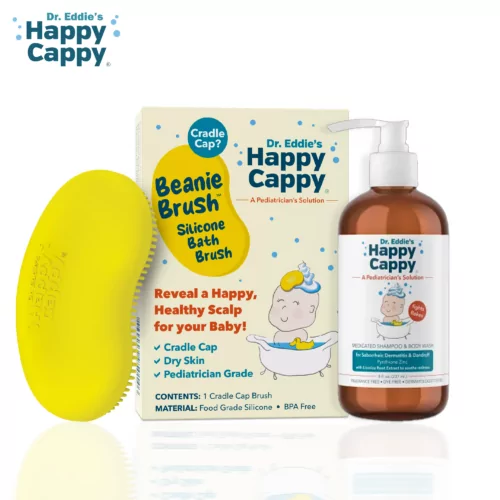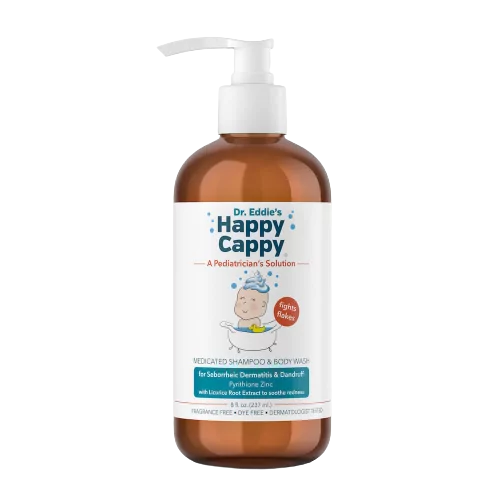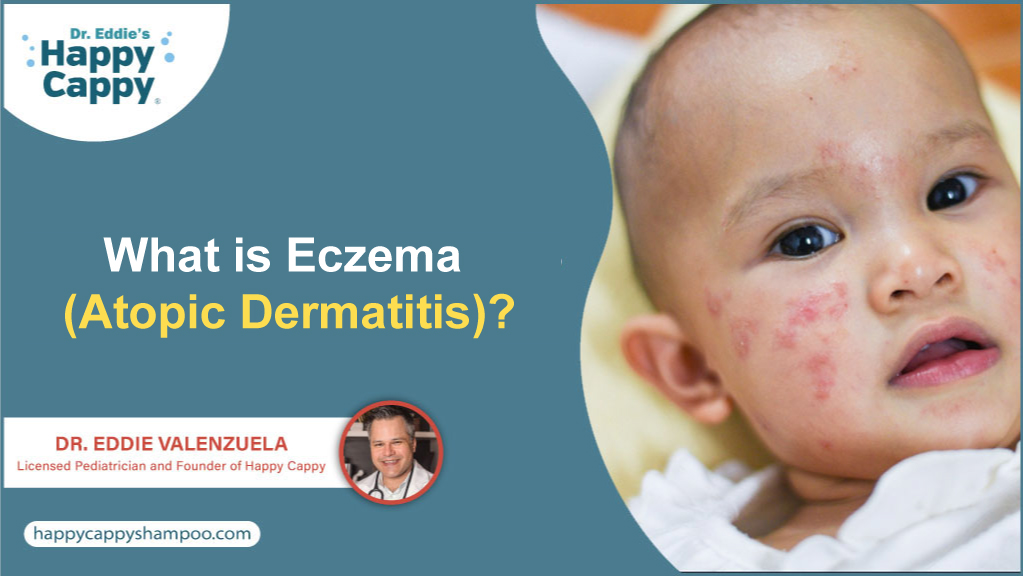
Eczema is an extremely common condition that makes you uncomfortable in your own skin…literally.
Common Eczema Symptoms
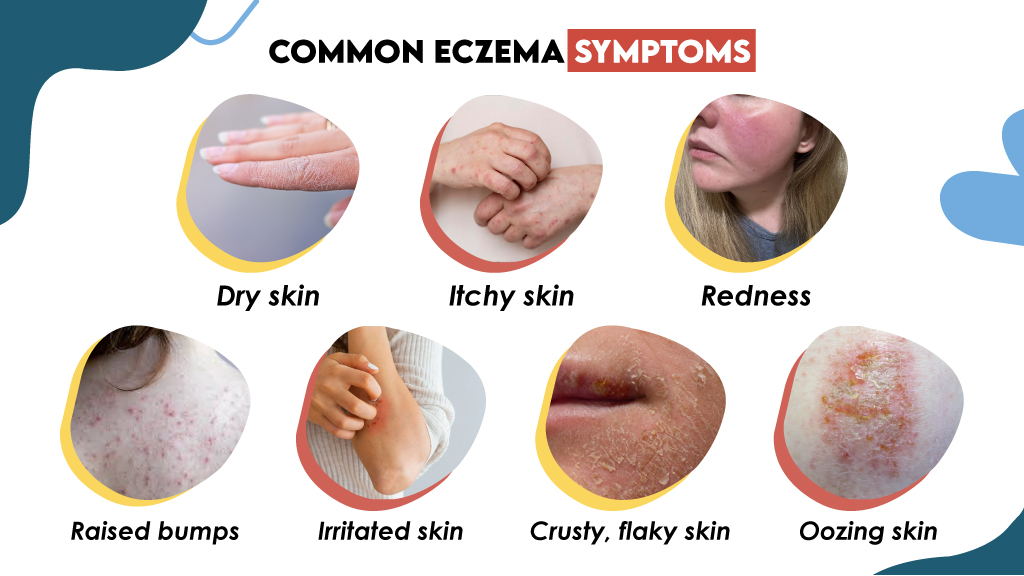
The hallmarks of Eczema or atopic dermatitis are dry, red patches of skin that become itchy and rough to the touch. Affected skin might crack, become thickened, or inflamed.
Some common eczema symptoms that can help you distinguish it from similar skin conditions like seborrheic dermatitis and psoriasis are.
- Dry skin
- Itchy skin
- Redness
- Raised bumps
- Irritated skin
- Crusty, flaky skin
- Oozing skin (in severe cases)
The redness and rashes associated with eczema may appear as pink or red on people with lighter skin tones, while on darker skin tones, it may appear as purple, brown, or darker than the skin tone.
What Causes Eczema?
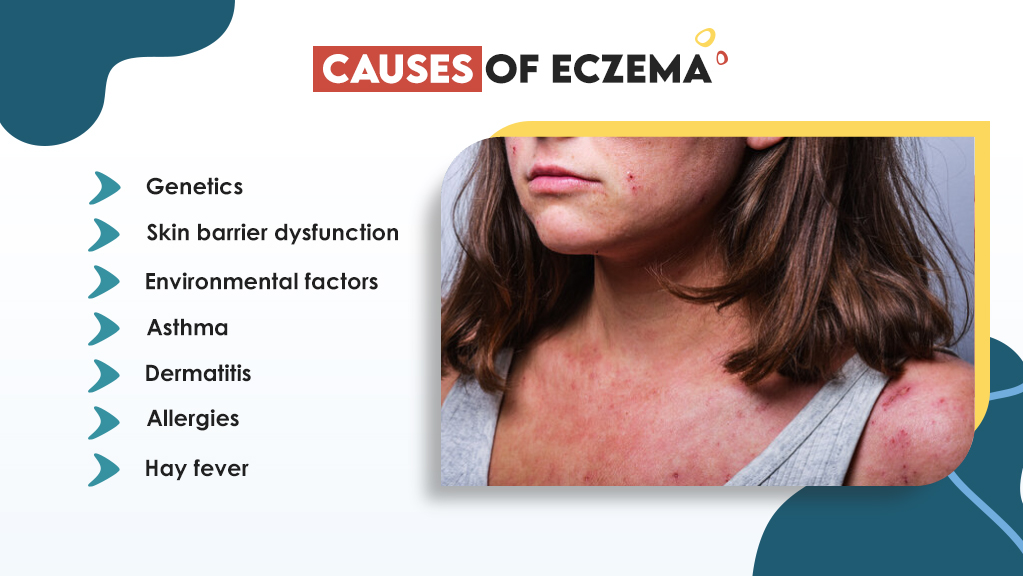
The exact cause of eczema is still not known, but it is believed to be caused by a combination of factors, such as
- Genetics
- Skin barrier dysfunction
- Environmental factors
Our skin has a natural barrier that is responsible for retaining the body’s moisture and protecting the body against outside irritants and allergens. But when this barrier is not working properly, the skin becomes dry more easily and prone to itching and irritation caused by eczema.
This skin barrier is disrupted due to various factors, which can also trigger eczema flare-ups.
- Hormonal changes
- Extreme weather
- Cold, dry air
- Irritants
- Allergies
- Dust mites
- Reaction to certain chemicals in skincare products.
Who Is At Risk?
Atopic eczema knows no age…it affects babies, children, and adults, but most people develop Eczema before age 5. Although it affects 30% of people in the United States, Baby eczema is often confused with other skin conditions like seborrheic dermatitis or cradle cap, since they can both begin in infancy.
Despite overlapping symptoms, the conditions are distinct and require different treatments. It’s helpful to know that Cradle Cap presents a brownish/yellow crust on the scalp, forehead, and eyebrows, beginning in the first several months of life. Learn more about the symptoms of Seborrheic Dermatitis from Dr. Eddie.
People who have a family history of the following conditions are at a higher risk of developing eczema.
- Asthma
- Dermatitis
- Allergies
- Hay fever
Are Atopic Dermatitis And Baby Eczema Same?
These are different names used to describe the same condition. Chances are you’ll hear “Baby Eczema” and “Atopic Dermatitis” used interchangeably by your pediatrician or dermatologist.
Atopic dermatitis is the word mostly used when adults experience eczema, and baby eczema is specifically used when newborns or infants experience it.
How can I tell if a baby rash is Eczema?
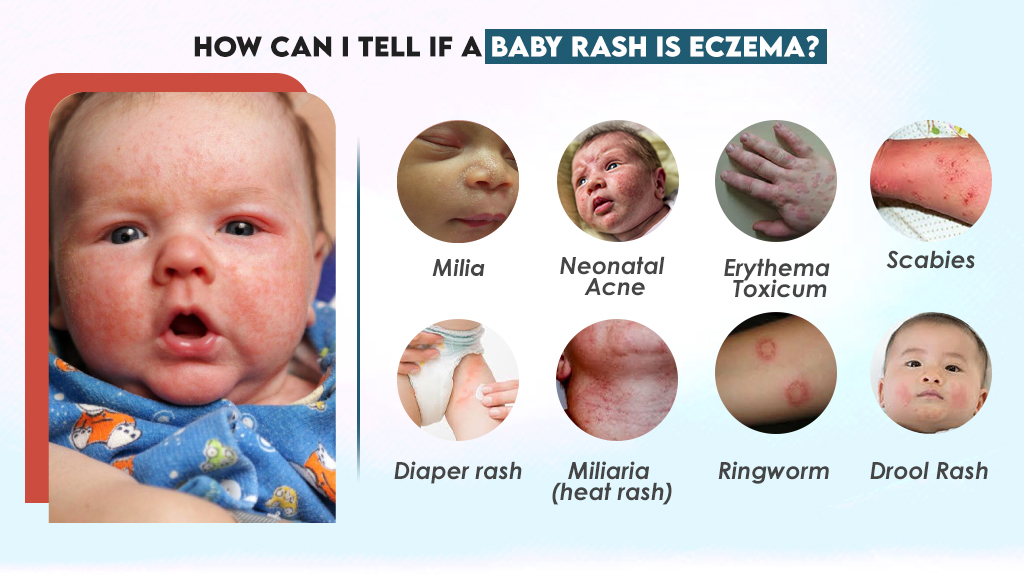
Newborns get many rashes that come and go.
- Milia (white spots on the nose)
- Neonatal acne (red bumps on cheeks)
- Erythema toxicum (ant bite-looking bumps all over the body)
- Scabies
- Diaper rash
- Miliaria (heat rash)
- Ringworm
- Drool rash
are just a few. But when Eczema shows up, it doesn’t go away within a few days or weeks.
Eczema In Infancy
With babies up to 2 years old, atopic dermatitis typically shows up on cheeks and on the opposite sides of joints — the part of your elbow you would rest on a table when leaning forward or the part of the knees that touch the ground when kneeling on the floor. In this age group, a rash might bubble up and sometimes leak a small amount of fluid, and extreme itchiness can interfere with an infant’s sleep.
Eczema In Childhood
In kids aged 2 until puberty, rashes tend to appear in the creases of the elbows/knees. Other common “Eczema Zones” include the neck, wrists, ankles, groin, and behind the ears. They may also experience bumpy rashes that become lighter or darker and skin thickening.
Eczema In Adults
In adults, atopic dermatitis tends to show up in the folds of the knees and elbows, and the affected skin can have a thickened, leathery feel to it.
Can it Get Infected?
The constant itchiness of Eczema in children is particularly hard for parents to manage because excessive scratching can occasionally lead to infection. You can tell the skin has become infected when the red patches become extra-red and raw.
Infection can also trigger blisters that may ooze or “weep” a clear fluid. These blisters can then get covered in a honey-colored crust. Some parents put eczema mittens or socks on their baby’s hands to avoid harsh scratching.
Is Eczema Contagious?
While infected skin might look bad, it is good to know that Eczema is not contagious. Your baby can’t “catch Eczema” nor infect anyone else. It is a condition that can definitely run in the family.
More than half of children with Eczema will outgrow the condition. Those who continue to have eczema flare-ups as adults will discover their rashes take on different characteristics and could go for years without symptoms.
Eczema Treatment
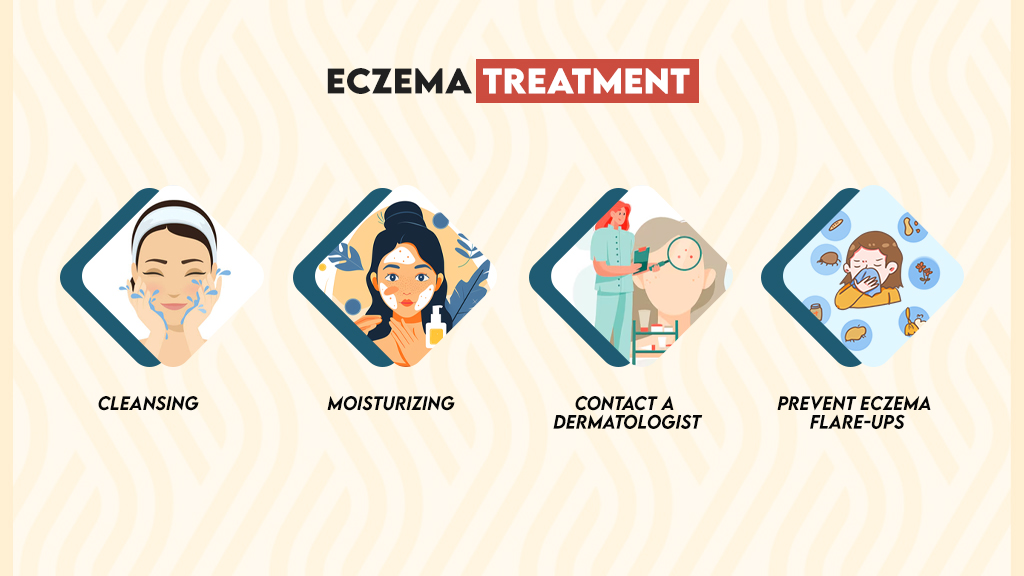
While there is no “cure” for eczema, there are treatments that can manage and ease the itching and irritation associated with it.
Essential for any baby, child, or adult plagued by Eczema rashes is gentle skincare that takes into account every single thing that gets put on the skin.
Cleansing
Cleansing is the first and most important step in managing eczema.
- At bath time, use lukewarm water and irritant-free cleansers.
- Soaps (and lotions) with fragrances and dyes can worsen irritated skin.
- Ideal bath time cleansers include products like Dr. Eddie’s Happy Cappy Daily Shampoo & Body Wash for eczema, a pediatrician-formulated cleanser specifically designed for itchy, dry, irritated skin.
Whatever you select, you want a pure cleanser without fragrances, dyes, parabens, or sulfates. Bath time should soothe and hydrate, not irritate.
Moisturizing
The next step in your skincare routine should be regularly moisturizing eczema skin with dermatologist-approved body wash, oils, creams, or ointments, which are available over the counter.
- Moisturize your skin at least twice daily, and if you suspect your skin is becoming dry more often, you can increase the frequency of use.
- Make sure to use an eczema cream that is free from any harsh chemicals so it does not further irritate the skin.
- Try Dr. Eddie’s Happy Cappy Moisturizing Cream. It is infused with glycerin and licorice root extract to help soothe dry, itchy, eczema-prone skin.
Contact a Dermatologist
If your eczema does not get better with a proper skincare routine, your doctor may prescribe corticosteroids, non-steroidal prescription creams, wet wrap therapy (in more severe cases), and anti-itch medications. Some adults get prescribed light therapy by their dermatologists.
Prevent Eczema Flare-ups
Even though there is no permanent cure for this itchy skin issue. However, making a few lifestyle changes and taking precautions can help reduce the recurrence of flare-ups. Here are the things that you must do
- Avoid the triggers, if you know which certain factor triggers your flare-up then try staying away from it.
- Use a gentle fragrance-free detergent to wash your clothes and bedding. Harsh detergents are often the culprit of causing dryness and itching.
- Wearing tight clothes can cause irritated skin and lead to sweating which can worsen your condition so try wearing loose-fitting clothes.
- There are certain fabrics such as wool that can cause allergy and rashes on your skin. If you want to prevent a flare-up always wear clothes made of soft, breathable material.
- Always use lukewarm or cool water to take a bath or wash your skin. Hot water and hot showers are a big no for people with eczema.
- Make sure any skincare product you are using is free from any irritating chemicals, or fragrances and has a low pH level.
- We know that eczema and dry skin can be very itchy. But not to scratch your skin when you have an urge. It will make your condition worse.
- It is important to keep your skin hydrated at all times to prevent a flare-up. So drink plenty of water to keep your hydrated on the inside and the outside.
Ingredients to Avoid for Eczema
Here is a list of the worst ingredients for eczema that you must avoid at all times in your skincare products. These have a tendency to irritate the skin, worsen the condition, or trigger an eczema flare-up.
- Paraben
- Sulfate (SLS, SLES)
- Fragrances
- Lanolin
- Salicylic acid
- Soy
Make sure the products you use are free from these ingredients even if you don’t have eczema. These ingredients can irritate normal and sensitive skin and lead to other skin conditions as well like dry skin, skin infection, and skin cancer.
Best Products for Eczema

Now that we have discussed what should be avoided if you have eczema let’s take a look at what will be best. The best eczema body wash, shampoo, and baby eczema cream is the one that is free from harsh chemicals including fragrance, sulfate, paraben, gluten, and phthalates.
Dr. Eddies has developed a Two-step Eczema Skincare Routine that includes eczema shampoo for adults and kids, and an eczema relief cream. these products have a low pH level and contain natural ingredients like licorice root extract, provitamin B5, aloe vera, and Glycerin that help soothe the itching and redness associated with eczema, hydrate the skin, and restore its natural barrier.
FAQs
What does Eczema look like?
Eczema, also known as atopic dermatitis, causes skin discoloration–red ( in light skin tones) or purple (on darker skin tones). And on top of that discoloration there is dry, itchy, flaky patches on the skin.
Is eczema contagious?
Eczema is not contagious; it is a chronic inflammatory skin condition. It is not caused by any virus, bacteria, or other infectious agents, so it will not be spread from one person to another, either through direct contact or any other means.
What is the cure for eczema?
Eczema can not be permanently cured as it is a skin condition that may come and go with flare-ups, but it can be managed with the help of Happy Cappy Two-Step Eczema Skincare Routine. It is formulated to soothe itchy, flaky, dry, eczema-prone skin.
Does eczema hurt babies?
If their eczema is not managed correctly, it will leave dry spots that can be very itchy which can lead to vigorous scratching and discomfort and lack of sleep. So, diagnosing and managing eczema as soon as possible is essential.

